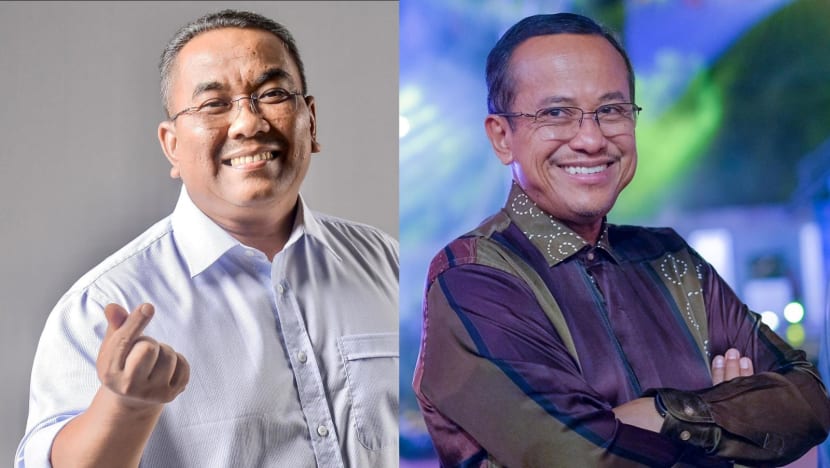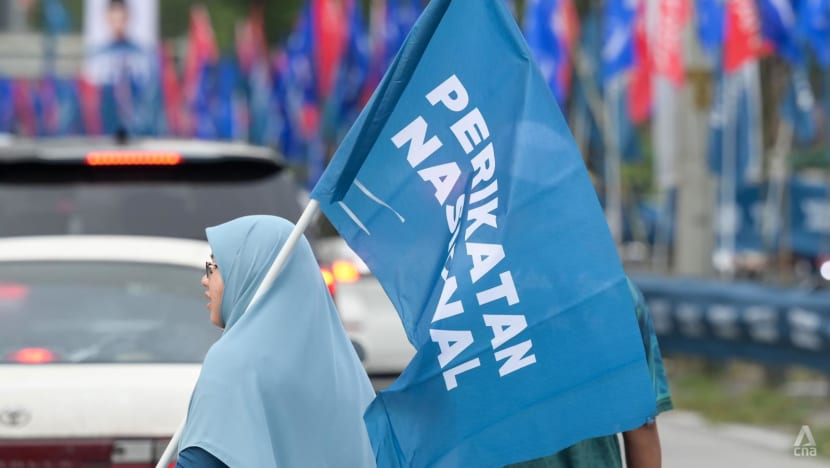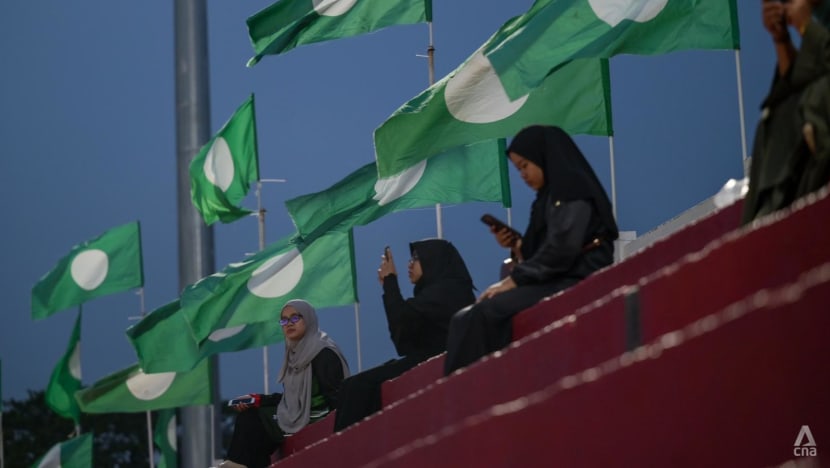Analysis: Strong state poll performance by Perikatan Nasional boosts stock for some PAS leaders, but obstacles lie ahead
Among those whose standing may be boosted by the coalition’s performance at the six state elections over the weekend include Kedah chief minister Muhammad Sanusi Md Noor - who has been compared to Donald Trump - as well as Terengganu chief minister Dr Ahmad Samsuri Mokhtar who led a clean sweep of the seats there.

Kedah chief minister Muhammad Sanusi Md Noor (left) and Terengganu chief minister Dr Ahmad Samsuri Mokhtar. (Photos: Facebook/N24MuhammadSanusiMdNor, DrAhmadSamsuri)
KUALA LUMPUR: The strong performance of the Islamist party Parti Islam Se-Malaysia (PAS) - a component party of the Perikatan Nasional (PN) coalition - at the six state elections over the weekend will undoubtedly boost the standing of its leaders, particularly that of the brash and outspoken Kedah chief minister Muhammad Sanusi Md Noor, say analysts.
They also believe another person whose political stock in PAS and nationally has risen is the Terengganu chief minister Dr Ahmad Samsuri Mokhtar, who led PN to a clean sweep of the state seats there.
While the PN coalition won big in the election by defending the three states under them, PAS was considered to be the biggest victor in the coalition.
Though the inroads PAS has made at the stage polls ride on and could strengthen in many parts of the country since the general election last year, analysts believe that the party’s increased political dominance could increase tensions within the opposition coalition.
At the same time, they note that Kedah, Kelantan and Terengganu will face challenges in its relationship with the federal government after the PN coalition gained supermajorities in all the three states it defended.
They believe that the federal government will sideline the three-state governments when it comes to funding for infrastructure and development.
The three states - which are located in the north and east coast of Peninsular Malaysia - are among the poorest in the country and depend heavily on the federal government for assistance.
“They have many problems in terms of infrastructure and development and rely on the intervention from the federal government to help them out,” said Dr Azizuddin Sani of Universiti Utara Malaysia (UUM).
Related:
SANUSI’S IMAGE BOOSTED
PN won 33 out of the 36 seats contested in Kedah, an improvement from the 20 seats it held before the state legislative assembly was dissolved.
Political analyst Dr Azizuddin believed that Sanusi’s image has been boosted among PN supporters - particularly that of PAS - after the coalition’s resounding victory in the state.
“Pakatan Harapan (PH) really put a lot of focus on Kedah and although Sanusi was attacked, he was able to counter these attacks, with the unity (government) unable to sway the votes.
“This has boosted his image and he will go for a higher position in the party. There is already talk that he will contest as deputy president in their next party election,” Dr Azizuddin told CNA.
During election campaigning, Sanusi was on the receiving end of relentless attacks by Home Minister Saifuddin Nasution, who is also from Kedah.
Mr Saifuddin had on occasion linked Sanusi to the alleged theft of rare earth elements in Bukit Enggang, Sik.
Sanusi - who has been compared to former US president Donald Trump and former Filipino president Rodrigo Duterte by many for his tendency to shoot from the hip - however took all these attacks in his stride and even launched counter attacks on his political “enemies”, including Prime Minister Anwar Ibrahim.
In the past, Sanusi has even taken on Johor crown prince Tunku Idris Ismail, with a spat between both of them taking place on social media.
Earlier in July, Sanusi was charged with two counts of sedition for allegedly insulting Selangor royalty, but many believed that he was able to use the cases to gain public sympathy.
Meanwhile, Dr Ahmad - the Terengganu chief minister - has also gained plaudits after leading PAS to a 32-0 win in the state election.
Unlike Sanusi, Dr Ahmad - who is an aerospace engineer by trade - did not resort to insults against his political opponents and was seen by observers to be a more inclusive person.
Political analyst Ibrahim Suffian of the Merdeka Center for Opinion Research believes that it is still early days to talk about succession in PAS as it was a more structured process and would require consensus from the party’s religious wing known as the Shura Ulama Council. The council is the highest decision-making body in the party.
Both Dr Samsuri and Sanusi are vice-presidents within PAS, considered to be the third-highest rank in the hierarchy of the party.
“Sanusi and Samsuri are high up, but both are seen as technocrats and not ulama. There might be some pushback from the religious faction,” he said.
CNA has contacted several high-ranking PAS leaders including Sanusi for comment.
White Rook Advisory senior advisor Dr Zaharuddin Sani Sabri said that while PAS could leverage Sanusi’s popularity to strengthen its position and advance its agenda, there were those in the party who were not in favour of the Kedah chief minister’s brash style of politics, and that this could generate internal tensions within the different factions in PAS.
“PAS is dominated by two groups - the technocrats and the religious faction. The technocrats and even youngsters might be okay with his style but for the religious group, his style would not be in line with the practise of Islam,” he said, adding that Sanusi’s comments about royalty may also cause discomfort for some.

BERSATU WORRIED ABOUT PAS’ PROMINENCE?
PAS’ spectacular showing at the election could also spell trouble for the dynamics within the opposition coalition.
Dr Zaharuddin of White Rook Advisory said there were high-ranking leaders in Parti Pribumi Bersatu Malaysia (Bersatu) who were worried about Sanusi’s star power.
While PN’s seats increased from 88 won in the 2018 elections to 145 in the recent state elections, PAS was the biggest winner with 116 seats won as compared to Bersatu’s 28 seats.
Parti Gerakan Rakyat Malaysia (Gerakan) - which is also part of the PN coalition - won a single seat in Kedah.
PAS now holds the chief ministerial posts in four states, the other being the northernmost state of Perlis. Bersatu, on the other hand, does not hold the post of chief minister in any Malaysian state.
Mr Ibrahim - the analyst from Merdeka Center for Opinion Research - told CNA that it is clear that PAS was now the principal party for the Malays in the country, taking over that mantle from the United Malays National Organisation (UMNO).
“PAS is the dominant party for certain. Bersatu still has a place there in a sense that it has a more moderate image compared to PAS but there might be problems in the future, leading up to next elections,” he said.
Dr Azizuddin agreed with Mr Ibrahim’s assessment and said that PAS was clearly the biggest party in PN.
“Many people believe that they should lead the coalition and that the chairman should be Abdul Hadi Awang (PAS president) and not Muhyiddin Yassin (Bersatu president),” he said.
The PN coalition made significant inroads in the state assemblies of Selangor, Penang and Negeri Sembilan, winning 22, 11 and five seats respectively. Of these, PAS won 10 seats in Selangor, seven in Penang and three in Negeri Sembilan.
It has also held the state of Kelantan since 1990, and racked up a 43-2 win in this year’s state election.
Dr Zaharuddin said that as PAS continues to align itself with PN and Bersatu, differing ideologies and policy priorities between the two parties could lead to disagreements and conflicts within the party itself.
“There are those in PAS who question why Bersatu seems to be the ‘bigger brother’ in PN. They are the majority but are being ruled by the minority.
“Currently, this is being swept under the carpet to portray unity,” he said, giving the example of why Bersatu secretary-general Hamzah Zainuddin was made the Opposition leader when PAS had more parliamentarians than them.

SIDELINED FROM FEDERAL FUNDING?
One issue that could crop up from PN’s big wins in the three states is the relationship between the state and federal governments, said analysts.
Dr Zaharuddin said that as these states were not aligned to the federal government politically, there could be an increase in political tensions, differing policy priorities, and discrepancies in resource allocations.
“They won’t get as much compared to the states aligned with the federal government. In politics, it is common for the term ‘anak tiri’ (stepchild) to be used metaphorically to describe a state government that is not aligned with the federal government,” he said.
Dr Azizuddin from the Universiti Utara Malaysia added the three states were among the poorest in the country and pointed to an interview by former Kedah chief minister Mukhriz Mahathir who had advised Sanusi not to be at war with the federal government.
“Like it or not, we can’t avoid it. It is different if we are Selangor or Penang, who are rich. When Penang was under the Democratic Action Party (DAP) and the federal government was under Barisan Nasional (BN), they didn’t look at the federal government. They could run on their own because the income from the state is in the billions.
“Kedah is a poor state and doesn’t have that room and luxury to be on our own. I would advise him that you should be diplomatic. Don’t be so personal,” Mr Mukhriz had said.
The three states that PN won in the election over the weekend contributed a total of 7.8 per cent to the country’s gross domestic product (GDP) in 2022.
In comparison, Selangor and Penang contributed 25.5 per cent and 7.4 per cent to the country’s GDP respectively.
Mr Ibrahim said that prior to the elections, there were many gestures from the federal administration that they would work closely with the state governments despite the political divide.
He said that when PAS fell to Terengganu for the first time in 1999, the then-prime minister Dr Mahathir Mohamad changed the way funding was directed to states, doing so by federal agencies instead of state agencies.
“In those parts of the country, patronage politics play an important role and if state agencies are not given funds, it would mean no ability to give contracts to favoured contractors and suppliers from the party,” he said.
He believed that the personal relationship between leaders also played a big role in the state’s fortunes.
“Sanusi has created a brand around himself by being someone who among other things challenges the national leader. It is not so easy to see how they (federal and state) are going to work together,” he said.
But after being sworn in again as chief minister on Monday, Sanusi said that he hoped for a “new beginning” in the state’s relationship with the federal government.
“I am ready for a new beginning. If they are ready, God-willing. If they keep it in their hearts. I don’t know. How can you keep these matters of administration in your heart? You can’t be angry at the choice of the people. This is a democracy,” he said.




















